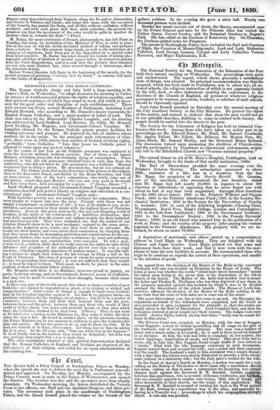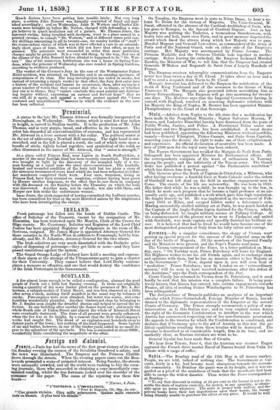bhp rtruhulis.
The National Society for the Promotion of the Education of the Poor held their annual meeting on Wednesday. The proceedings were quiet and unobstructed. The report, which shows generally a satisfactory state of things, was adopted. Its principal recommendation was that the proposal, which has been made in Parliament, was to admit into all en- dowed schools, the religious instruction of which is not expressly limitea by the will, deed, or other instrument creating the endowment, to the doctrines of the Church of England, all persons of whatever religious persuasion to be trustees, governors, teachers, or scholars of such schools, should be vigorously opposed.
Lord John Russell presided on Saturday over the annual meeting of the City Auxiliary Society to the City Missions. He praised the object of the society, and seemed to indicate that since the poor would not go to our splendid churches, disliking to come in contact with luxury, the- gospel should be carried into the streets to the poor.
The Society for the Liberation of Religion has held its triennial Con- ference this week. Among those who have taken an active part in its proceedings are Mr. Edward Baines, Mr. Miall, Mr. Samuel Courtauld, Mr. Apaley Peh'att, Mr. Tillett, kr. Dillw3rn, Sir Morton Peto, Mr. Adam Black, Mr. Samuel Morley, and the Reverend Henry Richard. The discussion turned upon promoting the- abolition of Church-rates, and the participation by Dissenters in educational endowments, origin- ally left to the Established Church now "b ecome national property."
The annual dinner in aid of St. Mary's Hospital, Paddington, held on Wednesday, brought to the funds of that useful institution 104/.
The Earl of Shrewsbury presided the same evening over the Printer's Pension Society. The subscription amounted to above 5001., exclusive of a like sum as a donation, from the late Mr. Biggs, the proprietor of the Family Herald. Mr. Cousins, one of the executors, who announced the last donation, stated that Mr. Biggs had left nearly 50,0001. in legacies to about 300 charities or individuals—it appearing that he never forgot one with whom he had at any time been acquainted. Amongst these donations are the 5001. above stated; 1001. to the Printers' Widows' and Orphan Fund; 1001. to the Printers' Almshouse Fund;', 100/. to the London Me- chanics' Institution; 2001. to the Society for the Prevention of Cruelty to Animals; 1004 to each of the following hospitals—Charing Cross, Westminster, Royal Free, King's College. London and Consumptive ; 1001. to the Life-boat Institution ; 1001. to the Governesses' Institute ; 1001. to the Dressmakers' Society ; 1001. to the Female Servants'. Homes ; 10001. to an old friend who assisted him in the publication of a work at Paris; and the residue of his property (after paying the various legacies) to the Printers' Almshouses. His property will, we are in- formed, be sworn as under 70,0001.
A deputation of merchants and others carried up a congratulatory address to Lord Elgin on Wednesday. They are delighted with his Chinese and Japan treaties. Lord Elgin pointed out that arms ands diplomacy have done their work, and that it now rests with the mer- chants to turn the new facilities to account. He recommended those who- begin to be cautious as regards the extent of their operations, and careful in the selection of goods.
An appeal from the decision of the Master of the Rolls in the renowned Thelluson will case was decided on Thursday in the House of Lords. The point at issue was whether the words " eldest male lineal descendant " meant the eldest male living at the given time or the descendant of the eldest branch of the family. The Master of the Rolls had decided that it meant the latter and Thomas K. Thelluson who was thus deprived of any share in the property appealed against this decision by which it was to be divided' amongst the descendants of the eldest branch. The House of Lords has, however, affirmed the decision of the Master of the Rolls settling at the same time that the costs of both sides are to come out of the estate.
The great Shrewsbury case has at last come to an end. On Thursday the arguments on behalf of the defendants were completed, and the Court at once proceeded to give judgment for the plaintiff; so that the estates are finally given to the Earl of Shrewsbury. Lord Campbell first, and then his colleagues entered at great length into their reasons. The Judges were very decided. Justice Bles, indeed, saying that there "really was no sound de- fence in this action."
The Divorce Court was occupied, on Monday, with the case of Suggate versus Suggate; a story of violent quarrelling and ill usage on the part of the husband, and of contemptible intrigues. The man was a teacher or music and a music-seller at Lowestoft ; he is said to have involved himself in an intrigue. At first, the wife had little to complain of, but neglect, the brutal language, deprivation of meals, and blows. This grew from bad to worse, till, in July last, Mrs. Suggate found rough drafts of love-letters to " Annie," filled with the idle language customary in such documents. Suggate missed them and accused his wife and a grand and final explosion was the result. The husband's reply to this statement was a simple denial;- with a hint that the letters were merely fabricated to provoke a little whole- some jealousy in a slatternly wife ; but the Jury gave a verdict for the wife. In the Court of Queen's Bench on Monday, a motion was made for a rule calling on the Bishop of Chichester to show cause why a mandamus should. not issue, calling on him to issue a commission for inquiring into certain-. charges made against the Reverend R. W. Randall. Certain squa,bbles, between this gentleman, who is accused of Roman tendencies, and his "Wets who are strongly opposed to candles and crosses, little bits of fringe, and other decorations in their church, arc the origin of this application. The Reverend R. W. Randall is accused of turning his back to the West instead of the East, bowing in a superfluous way to the altar, and generally be- having in a Puseyite wayproceedings to which his congregation strongly object. A rule nisi was granted.
Quack doctors have been getting into trouble lately. Not very long since, a certain John Bennett was formally convicted of fraud and pun- ished accordingly ; and on Wednesday, John N. Welters and Charles Ed- wards were brought up before Mr. Norton, charged with defrauding a sim- ple believer in quack medicines out of a guinea. Mr. Thomas Jones, the innocent vietun, being troubled with deafness, went to a place named in a printed circular, to consult "Dr. Watters," and at different times paid sun- dry shillings amounting Ulan to twenty-one, for sundry bottles of " stuff'," the transcendent virtue of which was to have effected a cure in an astonish- ingly short space of time, but which did not have that effect, as may be guessed. The prisoners were remanded in order that more particular charges might be prepared. It is a very odd thing, by the way, that one of the alio/4es of the John Bennett before alluded to happened to be "Dr. Rat- ters" One of his numerous habitations also was a house in Spring Gar- dens, while the prisoner of Wednesday also once resided in Spring Gardens, according to evidence produced.
The verdict of the Coroner's Jury in the case of the Westminster Palace Hotel accident, was returned on Thursday and is an amusing specimen of compositions of its class. The long investigation has ended in smoke, but instead of returning a simple verdict to that effect, the Jury first enter into a history of the accident and lament its occurrence, then, after saying in a great number of words that they cannot find who is to blame, or whether any one is to blame, they " cannot conclude this most painful and distress- ing inquiry without; expressing an earnest and fervent hope " that no one will do it again, andappend a verbose protest against the " loose confused and unsatisfactory " snanner in which the evidence in the case has been collected.



























 Previous page
Previous page